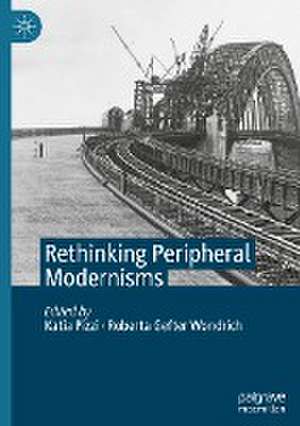Rethinking Peripheral Modernisms
Editat de Katia Pizzi, Roberta Gefter Wondrichen Limba Engleză Hardback – 3 ian 2024
Preț: 726.69 lei
Preț vechi: 886.21 lei
-18% Nou
Puncte Express: 1090
Preț estimativ în valută:
139.07€ • 144.65$ • 114.81£
139.07€ • 144.65$ • 114.81£
Carte tipărită la comandă
Livrare economică 14-28 aprilie
Preluare comenzi: 021 569.72.76
Specificații
ISBN-13: 9783031355455
ISBN-10: 3031355458
Pagini: 200
Ilustrații: XXI, 200 p. 3 illus., 2 illus. in color.
Dimensiuni: 148 x 210 mm
Greutate: 0.42 kg
Ediția:1st ed. 2024
Editura: Springer International Publishing
Colecția Palgrave Macmillan
Locul publicării:Cham, Switzerland
ISBN-10: 3031355458
Pagini: 200
Ilustrații: XXI, 200 p. 3 illus., 2 illus. in color.
Dimensiuni: 148 x 210 mm
Greutate: 0.42 kg
Ediția:1st ed. 2024
Editura: Springer International Publishing
Colecția Palgrave Macmillan
Locul publicării:Cham, Switzerland
Cuprins
Introduction.- Part 1. Modernism and Peripherality: Theoretical Considerations.-1.1.Benita Parry – ‘Stylistic Irrealism in Peripheral Literatures as Symptom, Mediation and Critique of Modernity’.-1.2.Irene Ramalho Santos – ‘What is Peripheral about Peripheral Modernisms?’.- Part 2. Liminality in the ‘Semi-peripheries’.- 2.1. Katia Pizzi – ‘Trieste and the Untranslatable Modernism’.- 2.2. Roberta Gefter – ‘“From the Periphery of the Metropolis”: on Joyce’s Modern Irish Peripherealities’.- 2.3. Marilena Parlati – ‘Australian Modernisms Strike Back, or still Harping on “Margins”’.- Part 3. Metropolis, Technology, Cultural Transfer.- 3.1. Andreas Kramer – ‘Geographies of Peripheral Modernism: The Case of the Russian Avant-Garde (Khlebnikov, Eisenstein, Tret’iakov)’.- 3.2. Patricia Silva – ‘Transcultural Reception in the Postcolonial Periphery: Brazilian Modernism and the European Avant-Garde’.- 3.3. Ali Mozaffari & Nigel Westbrook – ‘In Search of the Authentic Modern: The Rhetoric of Architecture in Late 20th Century Iran’.
Notă biografică
Katia Pizzi is Senior Lecturer in Italian Studies at the Institute of Modern Languages Research, University of London and Director of the Italian Cultural Institute in London, UK. She has published extensively on the literary culture, memory and history of cities, especially the volumes The Literary Identities of European Cities (2011), Trieste: italianità, triestinità e male di frontiera (2007) and A City in Search of an Author: The Literary Identity of Trieste (2001). Pizzi’s most recent books include Italian Futurism and the Machine (2019), a monograph focusing on the cultural relationships between Modernism and industrial technology, including ‘peripheral’ areas. Pizzi’s current research interests include urban Modernism, the Cold War, future cities and cultural memory. Since 2020 Pizzi has been Director of the Italian Cultural Institute London, Ministry of Foreign Affairs and International Cooperation.
Roberta GefterWondrich is Associate Professor in English Literature at the University of Trieste, Italy, and general editor of Prospero, Rivista di letterature e culture straniere – A Journal of foreign literatures and cultures. She specialises in the field of contemporary Irish fiction, on which she has written a book and many articles. Her field of interests includes the contemporary English and Irish novel, neo-Victorianism, biofiction, James Joyce, J. M. Coetzee, thing theory and sea narratives. She is currently working on a monograph on the cultural object in contemporary fiction in English.
Caracteristici
Explores modernist movements from regions regarded as peripheral to global modernism Contributes to scholarship on the ‘transnational turn’ in New Modernist Studies Highlights the local and translocal specificities of modernist movements
